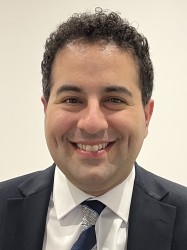Summary
Benjamin Mullish is a Senior Clinical Research Fellow in the Division of Digestive Diseases (Department of Metabolism, Digestion and Reproduction) at Imperial College London, and Honorary Consultant in Hepatology and Gastroenterology at St Mary's Hospital, Imperial College Healthcare NHS Trust. He qualified in Medicine from Cambridge University; following junior doctor roles and an Imperial NIHR-funded Academic Clinical Fellowship, he completed his PhD at Imperial College London, funded by a MRC Clinical Research Training Fellowship. He was later an Imperial NIHR Academic Clinical Lecturer before transitioning to his current role. His research focuses on clinical and translational aspects of microbiome manipulation (using intestinal/ faecal microbiota transplant (IMT/ FMT) and other approaches) for the treatment of digestive, infective, and other diseases.
Selected Publications
Journal Articles
Mullish BH, Merrick B, Quraishi MN, et al., 2024, The use of faecal microbiota transplant as treatment for recurrent or refractory Clostridioides difficile infection and other potential indications: second edition of joint British Society of Gastroenterology (BSG) and Healthcare Infection Society (HIS) guidelines, Gut, ISSN:0017-5749
Yip AYG, King OG, Omelchenko O, et al., 2023, Antibiotics promote intestinal growth of carbapenem-resistant Enterobacteriaceae by enriching nutrients and depleting microbial metabolites, Nature Communications, Vol:14
Routy B, Lenehan JG, Miller WH, et al., 2023, Fecal microbiota transplantation plus anti-PD-1 immunotherapy in advanced melanoma: a phase I trial, Nature Medicine, Vol:29, ISSN:1078-8956, Pages:2121-2132
Ghani R, Mullish BH, McDonald JAK, et al., 2021, Disease Prevention Not Decolonization: A Model for Fecal Microbiota Transplantation in Patients Colonized With Multidrug-resistant Organisms, Clinical Infectious Diseases, Vol:72, ISSN:1058-4838, Pages:1444-1447
Mullish BH, Michael DR, McDonald JA, et al., 2021, Identifying the factors influencing outcome in probiotic studies in overweight and obese patients: host or microbiome?, Gut, Vol:70, Pages:225-226
Allegretti JR, Kelly CR, Grinspan A, et al., 2020, Outcomes of Fecal Microbiota Transplantation in Patients With Inflammatory Bowel Diseases and Recurrent Clostridioides difficile Infection, Gastroenterology, Vol:159, ISSN:0016-5085, Pages:1982-1984
Ianiro G, Mullish BH, Kelly CR, et al., 2020, Reorganisation of faecal microbiota transplant services during the COVID-19 pandemic, Gut, Vol:69, ISSN:0017-5749, Pages:1555-1563
Mullish BH, McDonald JAK, Pechlivanis A, et al., 2019, Microbial bile salt hydrolases mediate the efficacy of faecal microbiota transplant in the treatment of recurrent <i>Clostridioides difficile</i> infection, Gut, Vol:68, ISSN:0017-5749, Pages:1791-1800
Allegretti JR, Mullish BH, Kelly C, et al., 2019, The evolution of the use of faecal microbiota transplantation and emerging therapeutic indications., Lancet, Vol:394, Pages:420-431
McDonald JAK, Mullish BH, Pechlivanis A, et al., 2018, Inhibiting Growth of Clostridioides difficile by Restoring Valerate, Produced by the Intestinal Microbiota., Gastroenterology, Vol:155, Pages:1495-1507.e15
Mullish BH, Quraishi MN, Segal JP, et al., 2018, The use of faecal microbiota transplant as treatment for recurrent or refractory Clostridium difficile infection and other potential indications: joint British Society of Gastroenterology (BSG) and Healthcare Infection Society (HIS) guidelines., Gut, Vol:67, Pages:1920-1941
Dhar A, Mullish BH, Thursz MR, 2017, Grand round: anticoagulation in chronic liver disease, Journal of Hepatology, Vol:66, ISSN:1600-0641, Pages:1313-1326
Mullish BH, Marchesi JR, Thursz MR, et al., 2015, Microbiome manipulation with faecal microbiome transplantation as a therapeutic strategy in Clostridium difficile infection., Qjm, Vol:108, Pages:355-359
Mullish BH, 2014, Case 25-2014: A man with ulcerative colitis and bloody diarrhea., New England Journal of Medicine, Vol:371, ISSN:0028-4793
Mullish BH, Kabir MS, Thursz MR, et al., 2014, Review article: depression and the use of antidepressants in patients with chronic liver disease or liver transplantation, Alimentary Pharmacology & Therapeutics, Vol:40, ISSN:0269-2813, Pages:880-892

